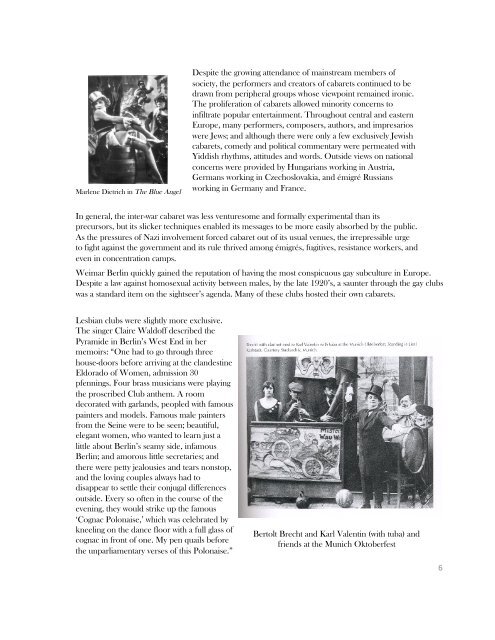You also want an ePaper? Increase the reach of your titles
YUMPU automatically turns print PDFs into web optimized ePapers that Google loves.
Marlene Dietrich in The Blue Angel<br />
Despite the growing attendance of mainstream members of<br />
society, the performers and creators of cabarets continued to be<br />
drawn from peripheral groups whose viewpoint remained ironic.<br />
The proliferation of cabarets allowed minority concerns to<br />
infiltrate popular entertainment. Throughout central and eastern<br />
Europe, many performers, composers, authors, and impresarios<br />
were Jews; and although there were only a few exclusively Jewish<br />
cabarets, comedy and political commentary were permeated with<br />
Yiddish rhythms, attitudes and words. Outside views on national<br />
concerns were provided by Hungarians working in Austria,<br />
Germans working in Czechoslovakia, and émigré Russians<br />
working in Germany and France.<br />
In general, the inter-war cabaret was less venturesome and formally experimental than its<br />
precursors, but its slicker techniques enabled its messages to be more easily absorbed by the public.<br />
As the pressures of Nazi involvement forced cabaret out of its usual venues, the irrepressible urge<br />
to fight against the government and its rule thrived among émigrés, fugitives, resistance workers, and<br />
even in concentration camps.<br />
Weimar Berlin quickly gained the reputation of having the most conspicuous gay subculture in Europe.<br />
Despite a law against homosexual activity between males, by the late 1920’s, a saunter through the gay clubs<br />
was a standard item on the sightseer’s agenda. Many of these clubs hosted their own cabarets.<br />
Lesbian clubs were slightly more exclusive.<br />
The singer Claire Waldoff described the<br />
Pyramide in Berlin’s West End in her<br />
memoirs: “One had to go through three<br />
house-doors before arriving at the clandestine<br />
Eldorado of Women, admission 30<br />
pfennings. Four brass musicians were playing<br />
the proscribed Club anthem. A room<br />
decorated with garlands, peopled with famous<br />
painters and models. Famous male painters<br />
from the Seine were to be seen; beautiful,<br />
elegant women, who wanted to learn just a<br />
little about Berlin’s seamy side, infamous<br />
Berlin; and amorous little secretaries; and<br />
there were petty jealousies and tears nonstop,<br />
and the loving couples always had to<br />
disappear to settle their conjugal differences<br />
outside. Every so often in the course of the<br />
evening, they would strike up the famous<br />
‘Cognac Polonaise,’ which was celebrated by<br />
kneeling on the dance floor with a full glass of<br />
cognac in front of one. My pen quails before<br />
the unparliamentary verses of this Polonaise.”<br />
Bertolt Brecht and Karl Valentin (with tuba) and<br />
friends at the Munich Oktoberfest<br />
6



